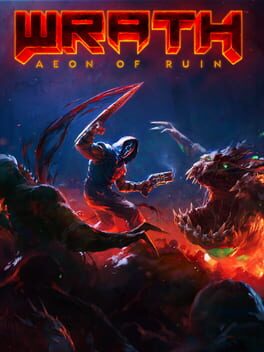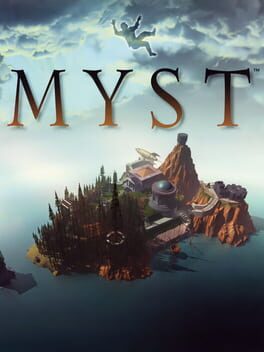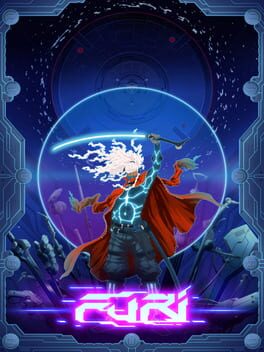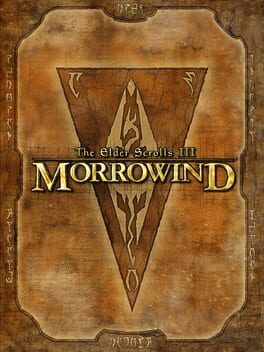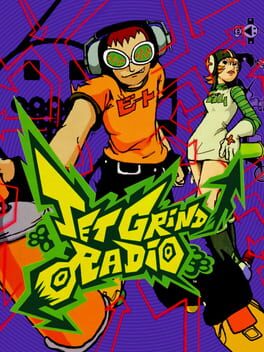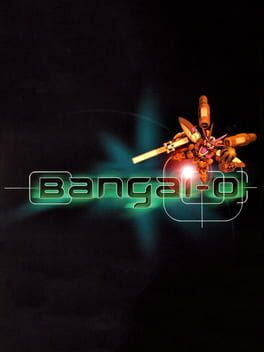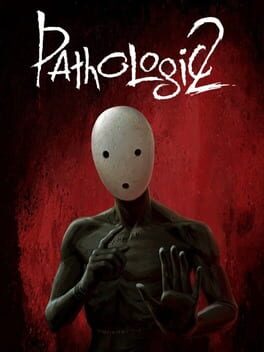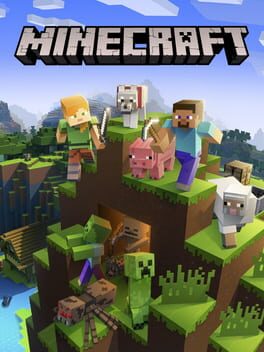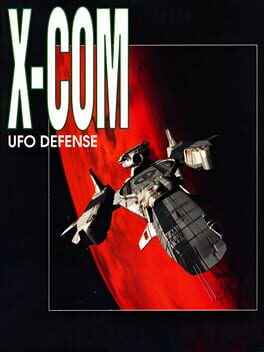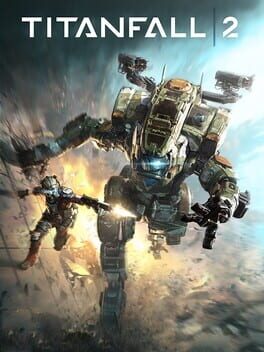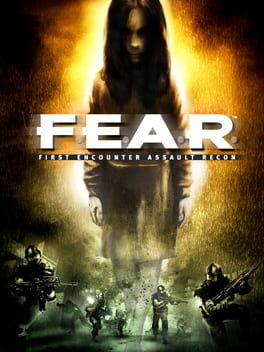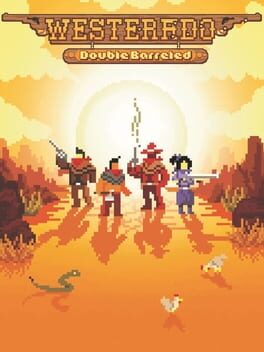Scamsley
2019
Wrath's appeal is a niche within a niche- the throwback shooter pivots itself on high-octane action inside of short/varied levels usually, and Wrath isn't this. It's high-octane; it's more intense than any other throwback shooter I've played by a heavy long shot, but it doesn't let you cool down. Levels are designed with less focus on a gimmick (arguably to its detriment) and more so with a focus on being gauntlets. Each one clocks in at about twenty minutes to half-an-hour if you're not speedrunning, and the appeal might seem limited given the small enemy roster and lack of variety, but I think Wrath taps into something totally worthwhile once you give it some time. The game slowly feeds you new content, thus demanding you figure out the ideal strategies for each enemy- which might reveal maybe the best weapon/item roster I've ever seen in these types of games. Every weapon has a primary fire and an alt-fire that is practical for the constant hostile ways enemies swarm you, and I do mean swarm you. Some levels clocked in at around 500+ enemies, and that's where Wrath's secret lays. It's as much a Serious Sam as it is a Quake, and it's a lot better than the average horde-shooter, too! Every weapon choice allows for high player expression here because they're pretty much all equally practical; you really need to balance out function and conserving ammo to invent your own ideal combos to put down the increasingly tanky enemies or large swarms. As the game really starts kicking you down with full on armies later on, it's always encouraged to explore for secrets and collect items, which are super utilitarian and I didn't find one of them uninteresting. Importantly, items are so limited that collecting them (and ammo) across multiple levels makes the entire game a resource-management challenge, as opposed to just one level usually. Saves themselves, being turned into an resource, also fixes one of the things I dislike most about classic PC gaming: the encouragement of save-scumming. Yeah, they could've dumbed down the number of Soul Tethers you get quite a bit, but just the notion of them and the Shrines is great. All of Wrath feels like a trial of reflex and moment-to-moment wit to me, and I love it! You might find it repetitive/padded, and I wouldn't blame you, but I loved Arcane Dimensions.
1993
I suspect Myst will go overlooked by the vast majority of modern audiences due to an (arguably) lackluster presentation, yet that may just be the ace up its sleeve. When you compare Myst to any other puzzle game, it's sort of mind-blowing how it has pretty much only individual puzzles per area, barring those having to directly interact with the Age gimmick, and yet there's next-to-zero communicative failure on a sensory side regarding what those puzzles do. Even if you're pixel-hunting to discover the mechanisms you need, or just clicking hopelessly to find another screen you missed somewhere, the actual mechanisms at play are immediately quite clear-cut and intriguing in function. They're industrial, you read the cues of how you'd physically interact with those objects and voila, you've done it. The scope of the areas leaves you still scratching your head about the greater purpose of anything you find in spite of this though, and it's this combination that makes Myst both a solid game for those completely unfamiliar with video games, and those who've spent their life on the medium. Almost every technique here is beginner-friendly, but doesn't push away hardcore players, so much so that the only method of movement is extremely intuitive in a way I think almost anyone could immediately grasp, and is hard to formulate solid complaints against at the same time given Myst's goals. It'll lure in newcomers... but it'll also interest anyone deeply familiar with video games as a whole, with its fascinating setting and worldbuilding that don't fall clearly into any genre of fiction, alongside the creative puzzle concepts, which make the process of "fucking around with (effectively) alien contraptions" all the more alluring. If there's any point to take away from all this: designers of the future, and players, should probably go back to Myst to voice how to clearly communicate unique gameplay ideas without overt text being a driving factor, because it's excellent nonetheless.
2016
When you think about bosses in video games, and you think about how video games translate to other mediums, bosses are one of those abstract elements that get confusing in translation. A boss, would presumably be some kind of side villain or obstacle on the journey to the destination in another story, but of course video games supplement you with way more than just one side antagonist or so usually. The dissonance here is that usually an antagonist of any kind is expected to have some kind of prominence, or power, or at the very least personality. They need to serve a purpose, and serve it well, and it's arguable video game bosses don't succeed at this. Rarely do they really activate the sensation you're "fighting" so much as the sensation you're just going through clear-cut scripted motions to get through them. Most bosses are sub-par, basically. Often they're only stressing one element and not the most important factors of being an engaging combatant; even in the best boss-driven games. Furi's success is completely natural then, because it's a neon anime-fight lightshow. You'd be struggling to convey how it blends genre but saying "it's how a kid imagines a swordfight" might just sum it up best. Flashy, snappy, fast-paced and constantly changing perspective, aggressor and methodology of attack. Jumping from swarms of bullets to rapid-fire melee quick-time events works out perfectly thanks to the general aesthetic and flow that makes it all feel natural. Bosses have linear phases, but they still move quite freely around the arena usually, and, using some tension built up during the fight, contextualize all their actual scripted phases perfectly. If anything, Furi should tell you that every game from now on focused around bosses should strive for these kinds of multi-phased monsters, and we should've known it since Seven Force. What Furi might not be able to tell other games, is to match its exceedingly strong degree of variety per-fight that sees you seamlessly jumping between everything cool in the book, which helps further differentiate every (already solid) phase of every (already solid) boss.
If you've ever felt disenchanted by the lackluster and untense sameyness and structure of boss fights in even the greatest of action games, then Furi is waiting for you with open arms.
If you've ever felt disenchanted by the lackluster and untense sameyness and structure of boss fights in even the greatest of action games, then Furi is waiting for you with open arms.
It's a game of abstractions and endless complexity, but the way those integrate might seem confusing to one unfamiliar. Morrowind, if anything, is the greatest simulator of living in a fictional world ever devised. It might not care as much about the monotonies of day-to-day life in a setting like this, unlike some other games, but it immerses you in the culture and land in a way unlike any other.
Everyone hates you, everywhere pushes you away, everything is too strong to be fought and nothing makes a lick of sense. To successfully integrate into the culture of Morrowind is to basically become a scholar of your own; it's highly advisable to just explore towns, do little errands for people and read books, not only because they provide skill-checks, but often the written information is genuinely useful. What you'll find is one part metaphysical mindfuck once you dig too deep, but another part that's a world that characterizes itself perfectly. Most quests you do are just random tasks you're doing for folks, and you're not typically treated like a legendary figure just for engaging in questlines, but you become more intimately familiar with Morrowind itself, and when you've gone around doing enough quests, reading enough books, plundering enough dungeons and stealing enough herbs (like you should) for the right amount of time, you've breathed in the culture of Vvardenfell. When you fulfill the ancient prophecy, it means something; because you've already learned why and how the ancient prophecy matters. Being able to meet a member of the Tribunal or Sixth House is about as impactful as it should be in the lore, and If it isn't painfully clear already, Morrowind's immersion is excellent and it's the iceing on the exploratory cake of the gameplay. Wandering over a hill and finding something enlightening or just plain fucking weird is great, and the game offers you a million ways to deal with it. It's not a game about dialogue choices per-say, but a game of more general choice. There's nothing the game tells you that you can't do due to your build, just stuff you're not as good at, so preparative thinking before every quest can be essential to make the most of your abilities and minimize the worst. Often, you'll find completely unexpected solutions for quests that came solely as a result of your usage of the mechanics, and it always feels rewarding seeing it happen. There's a point in the game where you'll notice there's buildings that you have to levitate up to, just because: hey, there's genuine wizards in this world! That's Morrowind at its best, and it's up to you to see what will work out... or maybe not, cause you can just go explore elsewhere!
Where it loses people is in muddied abstraction; the game doesn't give many dialogue choices, conversations are treated like browsing wikipedia, it's extremely vague about what some things are supposed to represent in animation terms and, while this is all a flaw of not utilizing the visual part of the medium more, it's easily fixable by letting your mind do the work. Walking up as a newcomer and asking about key-questions to random people in the street, often things they won't know about, feels like the equivalent of asking around in a genuine new place, just scrambling to get clues on the area. Having your character not be visually shown missing hits or dodging them might seem tacky, but mentally fill in the blanks and realize that it serves to convey the dangers of Morrowind, and furthermore, that you can reach a point where you're able to dodge thousands of hits hurdling at you; it's just straight up awesome. There's lots of places that really needed more detail, and the AI can be downright laughable, but by the endgame you're hardly thinking of that because it fed into your growth so well the whole time. For all these abstractions, weirdly complicated mechanics, missed opportunities or immersion-killers, it's incredible that you can still feel perfectly immersed as an outlander at the start being beaten down by shitty insects, and be equally immersed as a CHIM-enlightened Telvanni super-mage who can jump across the continent, blast down fireballs strong enough to eviscerate entire cities and summon armies of otherworldly invaders to do your bidding. It's all immersive, and it all makes perfect canonical sense in Kirkbride's Godhead fever-dream; including console commands! It's an unmatched sense of immersion, it's got unmatched storytelling, it's got an unmatched power curve, the exploration is wonderful, and it has a setting more fascinating than any other fantasy world... well, barring maybe one exception. Praise the Sixth House, and play Morrowind. Try not to view the slow-walking and missing hits as a negative, but as a necessary part of the games mechanically nuanced RPG mechanics; it's all meant to convey the dream, and you're the Nerevarine, not the sharmat. Go forth on your adventure, unless you happen to not be the one, in which case, your time may come again, Moon-and-Star.
Everyone hates you, everywhere pushes you away, everything is too strong to be fought and nothing makes a lick of sense. To successfully integrate into the culture of Morrowind is to basically become a scholar of your own; it's highly advisable to just explore towns, do little errands for people and read books, not only because they provide skill-checks, but often the written information is genuinely useful. What you'll find is one part metaphysical mindfuck once you dig too deep, but another part that's a world that characterizes itself perfectly. Most quests you do are just random tasks you're doing for folks, and you're not typically treated like a legendary figure just for engaging in questlines, but you become more intimately familiar with Morrowind itself, and when you've gone around doing enough quests, reading enough books, plundering enough dungeons and stealing enough herbs (like you should) for the right amount of time, you've breathed in the culture of Vvardenfell. When you fulfill the ancient prophecy, it means something; because you've already learned why and how the ancient prophecy matters. Being able to meet a member of the Tribunal or Sixth House is about as impactful as it should be in the lore, and If it isn't painfully clear already, Morrowind's immersion is excellent and it's the iceing on the exploratory cake of the gameplay. Wandering over a hill and finding something enlightening or just plain fucking weird is great, and the game offers you a million ways to deal with it. It's not a game about dialogue choices per-say, but a game of more general choice. There's nothing the game tells you that you can't do due to your build, just stuff you're not as good at, so preparative thinking before every quest can be essential to make the most of your abilities and minimize the worst. Often, you'll find completely unexpected solutions for quests that came solely as a result of your usage of the mechanics, and it always feels rewarding seeing it happen. There's a point in the game where you'll notice there's buildings that you have to levitate up to, just because: hey, there's genuine wizards in this world! That's Morrowind at its best, and it's up to you to see what will work out... or maybe not, cause you can just go explore elsewhere!
Where it loses people is in muddied abstraction; the game doesn't give many dialogue choices, conversations are treated like browsing wikipedia, it's extremely vague about what some things are supposed to represent in animation terms and, while this is all a flaw of not utilizing the visual part of the medium more, it's easily fixable by letting your mind do the work. Walking up as a newcomer and asking about key-questions to random people in the street, often things they won't know about, feels like the equivalent of asking around in a genuine new place, just scrambling to get clues on the area. Having your character not be visually shown missing hits or dodging them might seem tacky, but mentally fill in the blanks and realize that it serves to convey the dangers of Morrowind, and furthermore, that you can reach a point where you're able to dodge thousands of hits hurdling at you; it's just straight up awesome. There's lots of places that really needed more detail, and the AI can be downright laughable, but by the endgame you're hardly thinking of that because it fed into your growth so well the whole time. For all these abstractions, weirdly complicated mechanics, missed opportunities or immersion-killers, it's incredible that you can still feel perfectly immersed as an outlander at the start being beaten down by shitty insects, and be equally immersed as a CHIM-enlightened Telvanni super-mage who can jump across the continent, blast down fireballs strong enough to eviscerate entire cities and summon armies of otherworldly invaders to do your bidding. It's all immersive, and it all makes perfect canonical sense in Kirkbride's Godhead fever-dream; including console commands! It's an unmatched sense of immersion, it's got unmatched storytelling, it's got an unmatched power curve, the exploration is wonderful, and it has a setting more fascinating than any other fantasy world... well, barring maybe one exception. Praise the Sixth House, and play Morrowind. Try not to view the slow-walking and missing hits as a negative, but as a necessary part of the games mechanically nuanced RPG mechanics; it's all meant to convey the dream, and you're the Nerevarine, not the sharmat. Go forth on your adventure, unless you happen to not be the one, in which case, your time may come again, Moon-and-Star.
2000
TheCriticalThinker: "Why Precision Platformer "Wall Jumper" (game built around its controls that are designed in a way to be perfectly matched for the level design) Has The Best Game Feel" (video review, 40 minutes)
TheCriticalThinker: "Why Jet Set Radio (game built around its controls that are designed in a way to be perfectly matched for the level design with the goal of feeling like rollerskating) Just Hasn't Aged Well And Shouldn't Ever Be Replicated Without Fixing The Dogshit Jank Outdated Controls" (video critique, 4+ hours)
TheCriticalThinker: Why Do Modern Games All Feel Samey? (video analysis, 5 minutes)
Un-self-aware pretentious jab at un-self-aware pretentious videos aside, I have some thoughts to give for new players to maybe help with what doesn't click at first, or just to offer perspective. Context is a defining factor of enjoying almost anything; you wouldn't want to go in for what will be called a buffet only to find out it's actually a buffet of assorted rocks, dirt and shit; cause while it's not like you're being told there isn't rocks, dirt and shit in the buffet, it's not exactly what you're expecting by default, and Jet Set Radio's context in the modern era might do it a disservice; it's a clear-cut cult classic with a smooth and funky perception, and you're gonna head in and feel like you're controlling the least reliable guy ever brought into the medium. These controls are not hindering your ability to be smooth and bring out your sense of style, but they are designed to be an initial obstacle to your ability to immediately achieve satisfaction, and this is because Jet Set Radio isn't a game about vigorously showing off your delirious biznasty funky skills in a vacuum but rather a pretty intense time-attack game where the smoothness comes from the act of "not losing" instead of "winning".
So here's my advice: skip the tutorial, it's not helping you, it shows techniques you'll never need and makes out the game to be more complicated than it is. Instead of immediately thinking of doing tricks (assuming you're still able to get down with the time attack gameplay) try to think about the context of what this is; it's an arcade-y skating game, it's simulating an (exxaggerated) set of physics tied to skating, there is weight and momentum; you cannot jump and get anywhere without build-up and walls are a death sentence for your speed, but there's actually a significant degree of leeway given the "floaty jumps" are pretty much a life-saver in terms of pulling off long trick sequences. Try to enjoy the learning process, fuck around and try to naturally discover the techniques you can pull off. Jet Set Radio, at it's core, is a time-attack game where you're trying to gain territory while skating, and it's fundamentally faithful to all these ideas, and with this context you can better know if it'll appeal to you. Sloppy physics are there not to be forever be sloppy, but to make you feel the growth of your ability (hell, fucking around to learn will even help you find collectibles most likely) and the quick-time event graffiti? Notice how the timer beats down on you while you do it, and notice how cops come in to punish and hunt you as you're actively spraying; it is meant to put the heat on you. You're a punk, not a hippie!
TheCriticalThinker: "Why Jet Set Radio (game built around its controls that are designed in a way to be perfectly matched for the level design with the goal of feeling like rollerskating) Just Hasn't Aged Well And Shouldn't Ever Be Replicated Without Fixing The Dogshit Jank Outdated Controls" (video critique, 4+ hours)
TheCriticalThinker: Why Do Modern Games All Feel Samey? (video analysis, 5 minutes)
Un-self-aware pretentious jab at un-self-aware pretentious videos aside, I have some thoughts to give for new players to maybe help with what doesn't click at first, or just to offer perspective. Context is a defining factor of enjoying almost anything; you wouldn't want to go in for what will be called a buffet only to find out it's actually a buffet of assorted rocks, dirt and shit; cause while it's not like you're being told there isn't rocks, dirt and shit in the buffet, it's not exactly what you're expecting by default, and Jet Set Radio's context in the modern era might do it a disservice; it's a clear-cut cult classic with a smooth and funky perception, and you're gonna head in and feel like you're controlling the least reliable guy ever brought into the medium. These controls are not hindering your ability to be smooth and bring out your sense of style, but they are designed to be an initial obstacle to your ability to immediately achieve satisfaction, and this is because Jet Set Radio isn't a game about vigorously showing off your delirious biznasty funky skills in a vacuum but rather a pretty intense time-attack game where the smoothness comes from the act of "not losing" instead of "winning".
So here's my advice: skip the tutorial, it's not helping you, it shows techniques you'll never need and makes out the game to be more complicated than it is. Instead of immediately thinking of doing tricks (assuming you're still able to get down with the time attack gameplay) try to think about the context of what this is; it's an arcade-y skating game, it's simulating an (exxaggerated) set of physics tied to skating, there is weight and momentum; you cannot jump and get anywhere without build-up and walls are a death sentence for your speed, but there's actually a significant degree of leeway given the "floaty jumps" are pretty much a life-saver in terms of pulling off long trick sequences. Try to enjoy the learning process, fuck around and try to naturally discover the techniques you can pull off. Jet Set Radio, at it's core, is a time-attack game where you're trying to gain territory while skating, and it's fundamentally faithful to all these ideas, and with this context you can better know if it'll appeal to you. Sloppy physics are there not to be forever be sloppy, but to make you feel the growth of your ability (hell, fucking around to learn will even help you find collectibles most likely) and the quick-time event graffiti? Notice how the timer beats down on you while you do it, and notice how cops come in to punish and hunt you as you're actively spraying; it is meant to put the heat on you. You're a punk, not a hippie!
2001
The core gimmick at play in Bangai-O, minus the unique movement and level structure, is the ability to basically counterfire against enemy projectiles, with the intensity of the attack depending on how many projectiles are targeting you prior. Just so you know, this game was also a test of hardware to see how many projectiles could fire at you.
There are a lot of projectiles.
I'm taken aback by how unbelievably fun this game is, it should have gotten tiring with how oppressively consistent the gameplay is, but the ace up its sleeve is that you'll only get the full extent of the insanity dependent on the insanity of the level design, thanks to you requiring enemy projectiles to do anything truly awesome, and Treasure has endless fun with this. Some levels are like big playgrounds for you to stomp around in 'till you find the boss, others are intensive gauntlets of nonstop fire at you and some border on puzzle-esque elements regarding your knowledge of the games systems and various objects, all training you to improve yourself in a naturalistic way as the game goes on. Every part of the game is constantly stimulating your brain, even if just a little bit, and there's a surprising amount of semi-conscious thought that goes into aimlessly blasting missiles and lasers at everything. First of all the movement + aiming requires constant attention to maneuver around while still locking onto enemies, which is a heavy factor in survival when enemies are so plentiful and swarming you, but the risk-reward you're constantly weighing out in your brain is near unmatched. To do anything effective in this game, you have to actively get yourself into danger and get pummeled. There are no invincibility frames in-between hits; if you're bombarded and fuck up, you're toast. Therefore, to actually get things done, you need to be putting yourself in the face of death, but you're also putting yourself in the face of death in the near future as it's relying on your ability to continually recharge your counterfire, which is likely to recharge but it's not guaranteed you'll do it perfectly, adding an element to consider for going all out. The response the player might consider is that they shouldn't go all out if it's too much of a risk, but this itself starts being a problem as the game goes on. Levels are meticulously designed in ways to pummel you with near instakill death traps and pits of enemies firing bullets at you, with little details like one-way doors, slow domino effect explosive chains that can soft-lock you and walls that are receptive only to one type of fire (often at specific angles to utilize) littering the level design. This means any moment of passive play is actively fucking you over as you go on, and it's wonderful how well this all incentivizes the core fun of the gameplay: blowing everything to hell.
Focused design, focused levels, questionable bosses but an extremely solid circle of player psychology going on either way; check it out!
There are a lot of projectiles.
I'm taken aback by how unbelievably fun this game is, it should have gotten tiring with how oppressively consistent the gameplay is, but the ace up its sleeve is that you'll only get the full extent of the insanity dependent on the insanity of the level design, thanks to you requiring enemy projectiles to do anything truly awesome, and Treasure has endless fun with this. Some levels are like big playgrounds for you to stomp around in 'till you find the boss, others are intensive gauntlets of nonstop fire at you and some border on puzzle-esque elements regarding your knowledge of the games systems and various objects, all training you to improve yourself in a naturalistic way as the game goes on. Every part of the game is constantly stimulating your brain, even if just a little bit, and there's a surprising amount of semi-conscious thought that goes into aimlessly blasting missiles and lasers at everything. First of all the movement + aiming requires constant attention to maneuver around while still locking onto enemies, which is a heavy factor in survival when enemies are so plentiful and swarming you, but the risk-reward you're constantly weighing out in your brain is near unmatched. To do anything effective in this game, you have to actively get yourself into danger and get pummeled. There are no invincibility frames in-between hits; if you're bombarded and fuck up, you're toast. Therefore, to actually get things done, you need to be putting yourself in the face of death, but you're also putting yourself in the face of death in the near future as it's relying on your ability to continually recharge your counterfire, which is likely to recharge but it's not guaranteed you'll do it perfectly, adding an element to consider for going all out. The response the player might consider is that they shouldn't go all out if it's too much of a risk, but this itself starts being a problem as the game goes on. Levels are meticulously designed in ways to pummel you with near instakill death traps and pits of enemies firing bullets at you, with little details like one-way doors, slow domino effect explosive chains that can soft-lock you and walls that are receptive only to one type of fire (often at specific angles to utilize) littering the level design. This means any moment of passive play is actively fucking you over as you go on, and it's wonderful how well this all incentivizes the core fun of the gameplay: blowing everything to hell.
Focused design, focused levels, questionable bosses but an extremely solid circle of player psychology going on either way; check it out!
2019
This review contains spoilers
Pathologic 2 is easily the best written game I've played, and whether that notion inherently correlates to something being the peak of the medium is your choice to make. For me, that is not the case; but Pathologic has an insistence on backing up its strengths thematically with extremely rich gameplay.
The root of all things in life is contrast (and by extension context) which Pathologic delights in applying to its mechanics and flow to imbue them with more life than you'd be able to decipher from a mere surface level analysis. Getting an item of value is contrasted only by having something without value, so naturally Pathologic puts the economy in a constant state of shift and uncertainty that enforces the meaning of victories; even if they're only to be met with more suffering. The context part is more relevant to the game at large; Pathologic adds context from its excellently written and thought-provoking narrative to the act of walking. A constant timer ticks down as quest chains are divided into separate days with separate events within that day, thus requiring the player to always be thinking both about what they can do (to assess its value, in contrast to the less valuable) and what they will do; not an easy choice to make in a game with extremely abstract and nuanced writing that demands you think before you act. Your contextual expectations may prove to be your downfall as you can't create a new context to predict things approaching in a vacuum, as the days get darker and more hopeless with time.
The beauty of Pathologic 2's game design is that it builds a game out of expectations and thoughts, even when it's actually not all that complicated. Sure, there are definitely mechanics at play that absolutely intertwine in excellent ways, but they're not always much more complicated than your average survival game. Pathologic insists on tricking you and scaring you; it likes to tell you things will be worse than they truly are, and it wants you to struggle for thinking you dared to know how things will be. Only via remaining in a state of constant questioning and preparation can you be ready to take on the games heaviest days, when bodies fall left and right and you just can't deal with it. This is also effectively my takeaway on a deeper story analysis. There is extremely nuanced theming here, but if I am to state what I think it's trying to say: nothing. Not literally nothing, but rather I don't think it wants one to take away a strict impression; it's a game of much detail and you even get the opportunity to take on different roles, where you fail and succeed either way. Every character speaks in riddles that make you question yourself, and yet it doesn't matter if you did the opposite anyways, things still go wrong. However, I think if I am to touch upon themes it wants you to start having something to say about: individuality versus collectivism, industry versus environment, reality versus mythology, supply versus demand... I could keep going, but everything is connected here. The theme of connection, thread and the Lines (as the game puts it) is impossible to ignore; there is a tie between everything, and almost every interpretation will feed into every aspect no matter what. It has a multitude of direct concepts it tries to state: that man does not belong in civilization, that civilization is a tumor that is hurting Gaia, that collectivism is to achieve true immortality by feeding into the greater force than you that can never truly die, but then is quick to convey that; no matter what, man is to become a hivemind regardless and that this is not always positive, as the town descends into madness solely by the unintelligent hands of its own citizens. About the only thing truly wrong one can do in this situation where "right" is a mere theory, is think they know it all; no one does. Don't get me started on the meta-theatrical elements.
The strongest critiques likely land squarely in technicalities (it's a slavic studio so I cut them some slack; the game is still refined enough to have good menus) and areas of failed interactivity: I think there are large possibilities for characters to possibly get more involved in some questlines, I think there was more room for interesting stealth, I think the soundtrack is a little lacking in memorability, I think a more punishing save system ala Resident Evil could have added more pressure and I think structurally the sense of escalation actually eases a bit through the later days as you run out of questlines to fail and characters die regardless, but still, point gets across. The best argument I could have is that Artemy is inconsistent in choices you're given, since sometimes it seems like you can steer him in your "own" direction and sometimes it seems like you're forced to roleplay as a stubborn Artemy with little choice; but it's also a play with commentary on fate, so maybe it's all intentional? All in all, no matter what I say, it does what no other does. I praise games not usually for their writing quality, but how well they convey their thematical concepts through the gameplay, as truth be told, I think we almost never see games with truly incredible writing that still manage to be engaging. For every game that steps closer to being a book/movie, it steps away from embracing what makes it good as a game as you begin to feel strained from the fact that all the interaction you're doing really is just taking you away from digesting what actually matters by a certain point. Pathologic is an amazing game with amazing writing, and it doesn't slack on integrating genuinely strong storytelling all on its own with genuinely strong gameplay all on its own, and through context and contrast, the udurgh strengthens both. It's got some holes, but come on guys: this is what we need.
The root of all things in life is contrast (and by extension context) which Pathologic delights in applying to its mechanics and flow to imbue them with more life than you'd be able to decipher from a mere surface level analysis. Getting an item of value is contrasted only by having something without value, so naturally Pathologic puts the economy in a constant state of shift and uncertainty that enforces the meaning of victories; even if they're only to be met with more suffering. The context part is more relevant to the game at large; Pathologic adds context from its excellently written and thought-provoking narrative to the act of walking. A constant timer ticks down as quest chains are divided into separate days with separate events within that day, thus requiring the player to always be thinking both about what they can do (to assess its value, in contrast to the less valuable) and what they will do; not an easy choice to make in a game with extremely abstract and nuanced writing that demands you think before you act. Your contextual expectations may prove to be your downfall as you can't create a new context to predict things approaching in a vacuum, as the days get darker and more hopeless with time.
The beauty of Pathologic 2's game design is that it builds a game out of expectations and thoughts, even when it's actually not all that complicated. Sure, there are definitely mechanics at play that absolutely intertwine in excellent ways, but they're not always much more complicated than your average survival game. Pathologic insists on tricking you and scaring you; it likes to tell you things will be worse than they truly are, and it wants you to struggle for thinking you dared to know how things will be. Only via remaining in a state of constant questioning and preparation can you be ready to take on the games heaviest days, when bodies fall left and right and you just can't deal with it. This is also effectively my takeaway on a deeper story analysis. There is extremely nuanced theming here, but if I am to state what I think it's trying to say: nothing. Not literally nothing, but rather I don't think it wants one to take away a strict impression; it's a game of much detail and you even get the opportunity to take on different roles, where you fail and succeed either way. Every character speaks in riddles that make you question yourself, and yet it doesn't matter if you did the opposite anyways, things still go wrong. However, I think if I am to touch upon themes it wants you to start having something to say about: individuality versus collectivism, industry versus environment, reality versus mythology, supply versus demand... I could keep going, but everything is connected here. The theme of connection, thread and the Lines (as the game puts it) is impossible to ignore; there is a tie between everything, and almost every interpretation will feed into every aspect no matter what. It has a multitude of direct concepts it tries to state: that man does not belong in civilization, that civilization is a tumor that is hurting Gaia, that collectivism is to achieve true immortality by feeding into the greater force than you that can never truly die, but then is quick to convey that; no matter what, man is to become a hivemind regardless and that this is not always positive, as the town descends into madness solely by the unintelligent hands of its own citizens. About the only thing truly wrong one can do in this situation where "right" is a mere theory, is think they know it all; no one does. Don't get me started on the meta-theatrical elements.
The strongest critiques likely land squarely in technicalities (it's a slavic studio so I cut them some slack; the game is still refined enough to have good menus) and areas of failed interactivity: I think there are large possibilities for characters to possibly get more involved in some questlines, I think there was more room for interesting stealth, I think the soundtrack is a little lacking in memorability, I think a more punishing save system ala Resident Evil could have added more pressure and I think structurally the sense of escalation actually eases a bit through the later days as you run out of questlines to fail and characters die regardless, but still, point gets across. The best argument I could have is that Artemy is inconsistent in choices you're given, since sometimes it seems like you can steer him in your "own" direction and sometimes it seems like you're forced to roleplay as a stubborn Artemy with little choice; but it's also a play with commentary on fate, so maybe it's all intentional? All in all, no matter what I say, it does what no other does. I praise games not usually for their writing quality, but how well they convey their thematical concepts through the gameplay, as truth be told, I think we almost never see games with truly incredible writing that still manage to be engaging. For every game that steps closer to being a book/movie, it steps away from embracing what makes it good as a game as you begin to feel strained from the fact that all the interaction you're doing really is just taking you away from digesting what actually matters by a certain point. Pathologic is an amazing game with amazing writing, and it doesn't slack on integrating genuinely strong storytelling all on its own with genuinely strong gameplay all on its own, and through context and contrast, the udurgh strengthens both. It's got some holes, but come on guys: this is what we need.
2011
Probably the best idea anyone has ever had for a game. What characterizes Minecraft and allowed it to gain success was not that it was a limitless sandbox, but the fact it gamified already existing sandbox elements into something with legitimate structure.
Sandboxes had existed for years by the time of the devious little block game's inception, but Minecraft did it differently. Truth is, what makes Minecraft really work is the fact it's not just a sandbox. You don't start off as a god here, you become a god. Your own ability to work defines what you get out of it, and the game is actively prepared to throw hurdles at you while trying to get there. It's not just survival mechanics; Minecraft has a very cohesive vision of what construction is "for." Other entities in the world can interact with the world in similar manners to you, and your way of dealing with them could be swinging a sword, but it could also be machinery designed to trap and farm them. You could simply build a tower, and that's your job done, but it's the push to starting that effort that makes it feel like something more than other sandbox games. Everything here reinforces that, most prominently the melancholy yet encouraging music, which could have had absolutely any kind of style to fit any sort of element of the games amalgamation of genres and concepts; but instead of being action-packed adventure music, or anything fitting to the semi-fantasy setting, we got beautiful, relaxing and thought-provoking piano/ambient pieces which contend for the best music of any video game ever made to me.
There's a very classical computer game mentality to all this. Tons of freedom, tons of mechanical resistance, and everything coming together to form a sort-of-simulation sort-of-roguelike sort-of-tower-defense sort-of-sandbox hybrid that twists tongues to describe in concept but is just so elegant and comprehensible to see in motion. It may have nabbed a thing or two from Infiniminer's presentation, but Minecraft's sheer understanding of the potential of blocks elevates it to greater heights than recognizable. The game deserved its success, and the ultimate encapsulation of its best quality to me is that the most iconic element of the game about building, is an enemy that is willing to throw away all your hard work and blow it all up. Unique, and not once will we see it be truly replicated in a way that succeeds it.
Sandboxes had existed for years by the time of the devious little block game's inception, but Minecraft did it differently. Truth is, what makes Minecraft really work is the fact it's not just a sandbox. You don't start off as a god here, you become a god. Your own ability to work defines what you get out of it, and the game is actively prepared to throw hurdles at you while trying to get there. It's not just survival mechanics; Minecraft has a very cohesive vision of what construction is "for." Other entities in the world can interact with the world in similar manners to you, and your way of dealing with them could be swinging a sword, but it could also be machinery designed to trap and farm them. You could simply build a tower, and that's your job done, but it's the push to starting that effort that makes it feel like something more than other sandbox games. Everything here reinforces that, most prominently the melancholy yet encouraging music, which could have had absolutely any kind of style to fit any sort of element of the games amalgamation of genres and concepts; but instead of being action-packed adventure music, or anything fitting to the semi-fantasy setting, we got beautiful, relaxing and thought-provoking piano/ambient pieces which contend for the best music of any video game ever made to me.
There's a very classical computer game mentality to all this. Tons of freedom, tons of mechanical resistance, and everything coming together to form a sort-of-simulation sort-of-roguelike sort-of-tower-defense sort-of-sandbox hybrid that twists tongues to describe in concept but is just so elegant and comprehensible to see in motion. It may have nabbed a thing or two from Infiniminer's presentation, but Minecraft's sheer understanding of the potential of blocks elevates it to greater heights than recognizable. The game deserved its success, and the ultimate encapsulation of its best quality to me is that the most iconic element of the game about building, is an enemy that is willing to throw away all your hard work and blow it all up. Unique, and not once will we see it be truly replicated in a way that succeeds it.
2005
Simultaneously I think it's as good as people say but also overly hyped up; on one hand, a lot of the most praised things about RE4 really are things other shooters (and let's not beat around the bush: this is more of a shooter than a horror game) had already done at the time. The locational damage is probably the most unique thing at play here, but even that was done by other shooters beforehand, and a lot of 'em were on console, too! RE4 is at its best to me when it's putting emphasis on being a horde shooter. Enemies don't use firearms against you so it's mostly about figuring out how you'll deal with so many enemies as they slowly approach. The earlier sections in the village are definitely the best to me, as the hordes are in wide yet vertical areas but have the ability to continually breach your defenses in new ways, perfectly capturing the horror movie staple of an army of monsters swarming you in a way other games really haven't, and I enjoy it even if I don't find it scary (which I'd say conveys the success well). I'd also argue the castle mostly takes away the best of this though, and that's when the issues begin to really creep up on the game to me. Hordes get smaller and rooms get tighter as the cultists have less ways to engage with you, and truth be told I don't think the game is nearly as good when you're sniping religious zealots as it is when micromanaging villagers coming from every single window. This game also gives me major fucking trust issues as it goes on with the Merchant because every single time I'd spend all my money on upgrades for a single type of gun he'd just sell a straight up new gun that's far better I'd have to work up for every single time, even before I'd bought all the upgrades for the prior version of that gun, and I feel just having each weapon not get another "tier" would be better as then you'd only be working to diversify your arsenal rather than constantly spending on one type of gun in some kind of sunk cost fallacy. Ashley? Don't even get me started, she feels like she's just there because the developers played Ico at some point and often just becomes frustrating to deal with in my eyes, and half the best moments with her (making her hide) make you forget she's even there.
With all that said though, the hype is true in more of a structural sense. In any individual element I don't think it tops other players in the genre, but... it's just the total package. They finally found a system of gunplay which feels at home on a controller and from then on it just guarantees you quality gameplay and pacing with no pause. Once the ride of RE4 really begins it doesn't exactly stop, even with my problems with the castle and by extension (but a little less) the island. All the action-movie dumbness just gradually intensifies as it goes all out on being a constant escalating rollercoaster. Even if I have problems with RE4, it's just the easiest game to recommend because there's never a point where it becomes outright bad and the pacing carries it enough that the actual gameplay not being the best of the genre still is accounted for, and it'll never cease wowing you with spectacle and visuals, even as a two decade old game. It's good and above all else; entertaining the whole way through, a quality many games don't have.
With all that said though, the hype is true in more of a structural sense. In any individual element I don't think it tops other players in the genre, but... it's just the total package. They finally found a system of gunplay which feels at home on a controller and from then on it just guarantees you quality gameplay and pacing with no pause. Once the ride of RE4 really begins it doesn't exactly stop, even with my problems with the castle and by extension (but a little less) the island. All the action-movie dumbness just gradually intensifies as it goes all out on being a constant escalating rollercoaster. Even if I have problems with RE4, it's just the easiest game to recommend because there's never a point where it becomes outright bad and the pacing carries it enough that the actual gameplay not being the best of the genre still is accounted for, and it'll never cease wowing you with spectacle and visuals, even as a two decade old game. It's good and above all else; entertaining the whole way through, a quality many games don't have.
1994
Nothing short of a miracle of design. It could have been just a damn good tactical combat game, but they decided they wanted more. Instead, we get an extremely in-depth simulation about micromanaging your organization and the combat missions, and both sides are extremely good. The feedback between both sides is great too, as you frantically research the alien technology in hopes of fighting back the continually ramping up band of goons you face, which basically culminates in aliens that entirely turn your own squad against itself (Ethereals and Chryssalids) causing you to consider every single element even more carefully. Let's get this out of the way; if you want X-COM, there is no better game to play than X-COM in regards to what it does.
This all said, this game suffers from issues primarily tied to its longevity. Ships you see start being the same, individual troops get so powerful you can just send them in to kill out entire squads, the alien roster becomes predictable and the research feels meaningless. While I like the idea of hitting dead-ends, outside of the Flying Suit it rarely felt like any of the equipment I got was noticeably a huge improvement past the early game and it's only a problem because even the good stuff you research often feels a bit trivial as time goes on. It's worsened by the time you've realized that you've seen pretty much every consistent ship layout so every mission just becomes "send my one guy in and kill everyone unless there's a chryssalid in which case fuck time for my entire team to die." If campaigns weren't so long this would be a significantly better game IMO, but beggars can't be choosers; what exists here, in its current form, is still amazing and worth a play if any of the bullet points here interest you and you haven't played it. I fucking hate Chryssalids.
This all said, this game suffers from issues primarily tied to its longevity. Ships you see start being the same, individual troops get so powerful you can just send them in to kill out entire squads, the alien roster becomes predictable and the research feels meaningless. While I like the idea of hitting dead-ends, outside of the Flying Suit it rarely felt like any of the equipment I got was noticeably a huge improvement past the early game and it's only a problem because even the good stuff you research often feels a bit trivial as time goes on. It's worsened by the time you've realized that you've seen pretty much every consistent ship layout so every mission just becomes "send my one guy in and kill everyone unless there's a chryssalid in which case fuck time for my entire team to die." If campaigns weren't so long this would be a significantly better game IMO, but beggars can't be choosers; what exists here, in its current form, is still amazing and worth a play if any of the bullet points here interest you and you haven't played it. I fucking hate Chryssalids.
2016
Really cannot understand the hype here for the singleplayer; the movement mechanics are beloved for their speed but rarely is combat intense in any particular way. The few times movement mechanics are used in any way is solely to pad out the game with "wall-run here" in the exact same way you do across 90% of the campaign, while the more interesting gimmick (Titans) get barely any utilization for most of the campaign as you follow a structure of "do repeated wall-run marathons from A to B with the stages unique gimmick being used solely for the sake of adding more wall-running." The Titans have the better gunplay with more advanced horizontal movement options and abilities with cool-downs that theoretically should lead to the more engaging combat, and it does, the Titan bosses are actually decently enjoyable if still a little lacklustre but they still show promise; so they make you spend most of the game outside of the Titans fighting regular humans who have extremely aimless AI and are basically just targets to hit. The saving grace could be that the campaign puts an interesting gimmick in each level - or so it seems; in reality, these gimmicks basically never change gameplay beyond making you utilize the same basic movement options repeatedly as already stated, even the most beloved gimmick in the game doesn't change much besides an aesthetic effect really, and that's where the heart of my criticism is: most of the gameplay in Titanfall 2 is equipped solely to look a certain way rather than feel it.
The rating I applied is most definitely unfair; out of the contemporary shooters of the time it is better, but does that make it good? Well, all I can tell you is I didn't really get a shred of enjoyment from it.
The rating I applied is most definitely unfair; out of the contemporary shooters of the time it is better, but does that make it good? Well, all I can tell you is I didn't really get a shred of enjoyment from it.
1997
The argument to be made that struggle is inherent to human life, and that conflict is inevitable, is what I believe Fallout is proposing. Even if there's a happy ending, there will be a catch. Even if everything is looking perfectly fine, that One Asshole will ruin everything. Even if you've completely switched to pacifism, you will never have enough supplies to last long. Yet it's also a game about prosperity; all our desires to have perfect comfort and peace are a sign of ambition, and the fact is that what makes us wage wars and pillage (individuality, the ability to disagree, complex thinking) are the exact same things that makes us an ambitious, caring and philosophically daring species. I wouldn't want to babble about philosophy at the start of a review usually, but I think Fallout keenly agrees with these concepts; hell, even the stats system is titled "S.P.E.C.I.A.L.", encompassing several basic human capabilities, and you can't be bad at all of them. All of this makes it a better role-playing game as a result since, even if you're a hero, you'll still struggle or fail in some way, creating a sense of grit to the apocalypse that's lost when you're certain things will go as planned. The game also has an interesting flow to almost every single quest, because in spite of its occasionally corny or simplistic writing, there's almost always a caveat to either the situation itself, or how you will handle things due to the type of person you are, and it never feels completely ungrounded or unjustified. Spoilers for a 30 year old game, but this is the only game I've played where on top of killing or joining the main villain, you can also logically deduce a hole in his plan and cause him to commit suicide. Everything pays off, every little stat upgrade, trait or even just knowledge obtained elsewhere, even if it still backfires horribly it'll cause something, since Fallout knows having a degree of risk adds tension and relief to even the most basic of encounters. What really makes all this click so much, is that, in spite of not having too much content, almost all of Fallout's content that is there intertwines in a way that creates an interesting narrative. One little side quest will lead you down a chain that somehow results in you solving the main quest - there's very clear plotlines and arcs that all are woven together with the worldbuilding to create immense pay-off.
I think the cherry on top of all of this is the subtlety Fallout has in its writing. It's not usually that complex but I think that's cause it knows so many more nuanced elements speak for themselves. There's rarely monologues about fundamentals of the world or its history you can pry from folks besides stuff centric to their homes, and often some things that do exist are straight up denied (like the Deathclaws) by most. All of this goes without mentioning some bigger oddities like the whole cultural stagnation going on in the far future not being clearly spelled out, only implied and shown, which adds up to create an incredibly haunting atmosphere that permeates an extremely interesting and unique world. I don't want to sugar-coat the game since it has some extremely annoying elements (companions, a lack of some obvious choices you should have in places, unresponsiveness to certain things that really should have responsiveness in regards to role-playing, a lack of unique character sprites and enemies occasionally getting bonus attacks within the same turn) but this game is otherwise, effectively a masterpiece to me, and my real intelligence stat is at least above 3, so you can trust me!
I think the cherry on top of all of this is the subtlety Fallout has in its writing. It's not usually that complex but I think that's cause it knows so many more nuanced elements speak for themselves. There's rarely monologues about fundamentals of the world or its history you can pry from folks besides stuff centric to their homes, and often some things that do exist are straight up denied (like the Deathclaws) by most. All of this goes without mentioning some bigger oddities like the whole cultural stagnation going on in the far future not being clearly spelled out, only implied and shown, which adds up to create an incredibly haunting atmosphere that permeates an extremely interesting and unique world. I don't want to sugar-coat the game since it has some extremely annoying elements (companions, a lack of some obvious choices you should have in places, unresponsiveness to certain things that really should have responsiveness in regards to role-playing, a lack of unique character sprites and enemies occasionally getting bonus attacks within the same turn) but this game is otherwise, effectively a masterpiece to me, and my real intelligence stat is at least above 3, so you can trust me!
2005
What happens when you put all your eggs into one basket, but don't flesh out the basics? Lots of games have dealt with this problem (particularly Eurojank titles) and it causes a general issue with accessibility while usually making them extremely rewarding for those into the core concept. The important thing about this is that F.E.AR. is the opposite. You cannot feasibly be more attentive to the feel and mechanical fidelity of gunplay than F.E.A.R. The technical detail of the firefights and the way the level design folds around you during them is unmatched and, in a perfect world, would have set the new standard for how shooters would look and feel. F.E.A.R. relies on a lot of scripted set-pieces and audial cues to mask above-average artificial intelligence into looking downright genius, as the Replicas often are perfectly placed to land in a shot and catch you off-guard. The issue with F.E.A.R., is that it only cared about making the basics refined. The game rolls with plenty of gimmicks, from horror segments to slow-mo to karate kicking enemies, and absolutely none of them work well with the pre-established game design. The melee attacks are useless without the slow-mo to get close enough to enemies, but the slow-mo only exists to trivialize any encounter. Enabling bullet-time makes it extremely clear when something is scripted and makes enemies decisions retrospectively seem terrible, and bullet-time naturally regenerates too so it never feels like a tactical tool, effectively making the game completely mindless when you're using it. The horror? Completely detached segments where a little girl or flying skeletons chase you around a building before you go back to shooting. It's a complete hodgepodge mess, but for fans of shooters; it's a must-play.
In spite of all the problems and the repetitiveness the game begins to face, F.E.A.R. set a standard for gunplay that was never matched again. F.E.A.R. is the only game with shoot-offs this good and nothing else comes close to its level of technicality on this front; even the worst elements of the game only exist to strengthen that cinematic edge and personality it has, as there's nothing else that tries to have something as batshit as fighting ghosts and psychic soldiers with fucking martial arts. TL;DR: Mediocre horror game, questionable shooting fidelity if you're playing with all the gimmicks it slaps on, but an absolutely rock solid action-movie, and the combat is as good as it gets without any space marines or scientists if you ignore the bullet-time.
In spite of all the problems and the repetitiveness the game begins to face, F.E.A.R. set a standard for gunplay that was never matched again. F.E.A.R. is the only game with shoot-offs this good and nothing else comes close to its level of technicality on this front; even the worst elements of the game only exist to strengthen that cinematic edge and personality it has, as there's nothing else that tries to have something as batshit as fighting ghosts and psychic soldiers with fucking martial arts. TL;DR: Mediocre horror game, questionable shooting fidelity if you're playing with all the gimmicks it slaps on, but an absolutely rock solid action-movie, and the combat is as good as it gets without any space marines or scientists if you ignore the bullet-time.
Westerado is a game I'm hoping develops more of a cult-following, maybe not because it's anything mind-blowing at all on its own, but because it at least tries to execute the ideas I've been hoping to see rise over the past few years. Yes, it's a souped-up browser game and that limited scope is almost lethal to the games success, given missions have you doing not much more than going to Point A and Point B to either talk or shoot, but it's the way it wants you to talk and shoot, and how it ties that into everything else, that makes it so interesting. The entire game strings you through a long trail of breadcrumbs to figure out who your (randomly-selected) family's murderer is and every quest ties back into it usually with either money to get you further on your quest or a clue given detailing what he looks like, and sometimes you'll have every quest tying into every other quest with them either solving or failing themselves due to unexpected interactions they have. It's a very emergent style of storytelling, further bolstered by the ability to just pull a gun on anyone to change how they act, and sometimes it gets to the point that even bandits will begin to fear you and hesitate to attack from what you've done. The game has a lack of much content for you to do, but the connections and threads are constantly keeping it interesting and add to the replay value in a way I crave for other games, as it follows the sentiment of "actions speak louder than words" in a way similar games really don't usually, and it always gives you something to latch onto even without much of a strong main plot, just due to how deeply interwoven everything is. If any of this sounds interesting: go forth and play it, it's nothing amazing on its own, but it's an example for the future; a microcosm of design choices that I hope future role-playing games and adventure games pull from.
1990
Super Mario World might be the most acclaimed platformer of all time. It is extremely beloved universally and it makes sense why; it's very charming, it's got a plethora of content and it might be the most distinct feeling 2D Mario out there. Yet I must admit, I'm not fond of it for a very particular set of reasons.
Super Mario World's level design is something I have to consistently question, time and time again, in spite of its beloved reputation. The game is full of heart and yet it echoes an atmosphere where no ideas that the developers poured in actually got finalized or expanded upon. Think back to the Koopa Shells that home in on you; they could have done a lot with those, and I think we can agree a Mario level is at its best when it repeatedly iterates on ideas to create complexity and new challenges throughout the duration. That said, these homing Koopa Shells are only used a few times and are slapped at random parts of a level, with practically no iteration. Almost any unique concept is more so tossed around rather than slowly expanded upon. The ability to run up walls with those little smiley face blocks is practically completely underutilized for any serious platforming, and you don't really see Yoshi or the Cape get any serious usage either besides just being... there to trivialize levels. This wouldn't be so upsetting to me if the game at least had entertaining platforming by default, but Super Mario World clearly butchered not only stages of their creative gimmicks, but also any chance for interesting platforming due to overall flat, empty level design that doesn't engage you much. This is all addressing Super Mario World as a standalone platformer and not as a sequel mind you, and then I feel the need to bring up how the best elements of SMB3 are completely ditched here. No more dynamic levels that appear on the map, no more branching map gates, no more item shops, no more minigames and worst of all, no more P-Meter: the saving grace mechanically for even SMB3's least interesting levels. Even basic things that could have been tweaked to improve from that game just didn't get tweaked; does anyone else love when they get to the right of an auto-scrolling level and just have to sit there waiting for it to move even though you've already gotten through the obstacles? How about having every single level play a track you've probably heard in the first world before? There's even arguably a downgrade of precision, since although World controls extremely smoothly, you actually have a lot less leeway in regards to your jump. In 3 both the P-Meter and physics are teaming up to give you very smooth inputs. You lightly tap jump, Mario lightly jumps. You hold it down, he does a larger jump. Combining this with the momentum system and horizontal movement and you have a very dense but extremely controllable movement system. Mario's jumps in World don't have much room to compare though, since no matter how precisely you input they almost always have the same velocity and height, with only two notable variations if you really lightly tap jump, or heavily tap jump, neither of which offer much complexity or variety for segments that might need it. It ultimately leaves me sour on a game which, I really do appreciate for the sheer conceptual quality it has in so many departments. But I just can't bring myself to say that the game is more than average for me.
Super Mario World's level design is something I have to consistently question, time and time again, in spite of its beloved reputation. The game is full of heart and yet it echoes an atmosphere where no ideas that the developers poured in actually got finalized or expanded upon. Think back to the Koopa Shells that home in on you; they could have done a lot with those, and I think we can agree a Mario level is at its best when it repeatedly iterates on ideas to create complexity and new challenges throughout the duration. That said, these homing Koopa Shells are only used a few times and are slapped at random parts of a level, with practically no iteration. Almost any unique concept is more so tossed around rather than slowly expanded upon. The ability to run up walls with those little smiley face blocks is practically completely underutilized for any serious platforming, and you don't really see Yoshi or the Cape get any serious usage either besides just being... there to trivialize levels. This wouldn't be so upsetting to me if the game at least had entertaining platforming by default, but Super Mario World clearly butchered not only stages of their creative gimmicks, but also any chance for interesting platforming due to overall flat, empty level design that doesn't engage you much. This is all addressing Super Mario World as a standalone platformer and not as a sequel mind you, and then I feel the need to bring up how the best elements of SMB3 are completely ditched here. No more dynamic levels that appear on the map, no more branching map gates, no more item shops, no more minigames and worst of all, no more P-Meter: the saving grace mechanically for even SMB3's least interesting levels. Even basic things that could have been tweaked to improve from that game just didn't get tweaked; does anyone else love when they get to the right of an auto-scrolling level and just have to sit there waiting for it to move even though you've already gotten through the obstacles? How about having every single level play a track you've probably heard in the first world before? There's even arguably a downgrade of precision, since although World controls extremely smoothly, you actually have a lot less leeway in regards to your jump. In 3 both the P-Meter and physics are teaming up to give you very smooth inputs. You lightly tap jump, Mario lightly jumps. You hold it down, he does a larger jump. Combining this with the momentum system and horizontal movement and you have a very dense but extremely controllable movement system. Mario's jumps in World don't have much room to compare though, since no matter how precisely you input they almost always have the same velocity and height, with only two notable variations if you really lightly tap jump, or heavily tap jump, neither of which offer much complexity or variety for segments that might need it. It ultimately leaves me sour on a game which, I really do appreciate for the sheer conceptual quality it has in so many departments. But I just can't bring myself to say that the game is more than average for me.
